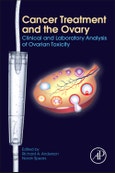The book describes both the clinical and laboratory approaches to discovering the potentially adverse effects of cancer treatment on the ovary, also laying out possible preventative approaches and future directions for the field.
Clinicians working in the field of reproductive biology and oncology will find an essential reference that provides the necessary tools to assess the reproductive toxicological effects of cancer treatments.
Please Note: This is an On Demand product, delivery may take up to 11 working days after payment has been received.
Table of Contents
Section I: Clinical
1. Ovarian Follicle Biology and the Basis for Gonadotoxicity 2. Relevant Cancer Diagnoses, Commonly Used Chemotherapy Agents and Their Biochemical Mechanisms of Action 3. Clinical Assessment of Ovarian Toxicity 4. The Current Understanding of Clinical Data on Ovarian Toxicity from Cancer Treatment
Section II: Laboratory Models
5. In Vivo Models of Ovarian Toxicity 6. In Vitro Models of Ovarian Toxicity
Section III: Strategies to Protect the Ovary
7. Ovarian Tissue Cryopreservation for Fertility Preservation 8. Current Clinical Approaches to Protecting the Ovary: GnRH Analogues 9. Preclinical Approaches to the Protection of Ovarian Function








